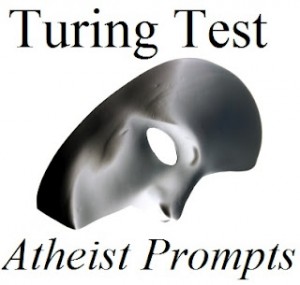This is the fourth entry in the Atheism round of the 2012 Ideological Turing Test for Religion. In this round, the honest answers of atheists are mixed in with Christians’ best efforts to talk like atheists. It’s your job to see if you can spot the difference. The voting link appears at the end of the entry, and you can look at all entries in this round here.
When (if ever) have you deferred to your philosophical or theological system over your intuitions?
In addition to being an atheist, I also consider myself a rationalist, a naturalist, a skeptic, and a humanist. These labels describe many different components of my philosophical system. I very frequently defer to my philosophical systems over my intuitions, largely because my intuitions aren’t very good. Ever since I was a little kid and especially in social situations, my intuitions royally sucked. Worse, I suffer from high anxiety, intuitions run amok. For certain situations, my gut just gets it all wrong and I start attending to the irrelevant details, dwell on baseless assumptions, and fixate on improbable outcomes. I get myself all worked up and either freak out, or totally shut down. My intuitions failed me all the time and made me miserable. Fortunately, philosophical systems heavily inform my deliberative reasoning skills. As the years went on and my knowledge about the world grew, my deliberative reasoning got better and better. Not only that, but these days, some of my deliberative reasoning has been so successful and used so often that they’ve replaced many of my old faulty intuitions. As weird as it may sounds to some, atheism was the gateway to science and rationalism and thus to a healthier, happier, and more successful life.
Are there people whose opinions on morality you trust more than your own? How do you recognize them? How is trusting them different than trusting someone’s opinion on physics?
This question feels really difficult to answer because I’m getting hung up on what is meant by “morality” and “trust”. It seems like everyone defines morality and trust a little bit differently. Not only that, but people usually sneak in their own pet assumptions. Since we don’t really have a clear definition, we may waste a lot of time arguing over meanings. So while my tentative answer would be “no”, I’d like to reframe the question to something a little more specific. Perhaps we’re asking “is there a category of people whose judgments I defer to over my own and at a higher frequency than other categories?” For that question, yes, definitely. And those people are usually cognitive psychologists, because these people know a lot about how people think and make decisions. In addition to recognizing them by their resumes and the letters behind their names, you can probably pick them out by the jargon they use, the terms that are used over and over. Because I think psychology is really just high level physics (neurons are made of quarks), trusting them is often very similar to trusting someone’s opinions on physics… you either speak the language or you don’t.
Can you name any works of art (interpreted pretty broadly: books, music, plays, poetry, mathematical proofs, etc) which really capture the way you see life/fill you with a sense of awe and wonder? You can give a short explanation or just list a few pieces.
Harry Potter and the Methods of Rationality by Eliezer Yudkowsky. It has it all. It’s funny. It’s touching. Its mysteries are logically consistent. Its plot twists are inventive yet logically consistent. And it kind of speaks to my life. I usually the smartest one in my peer group and it’s rather alienating. The Harry here feels like a much more intelligent version of me. Stumbling on Happiness by Daniel Gilbert really opened up the world of joy and happiness to me. Specifically it showed me how to and how not to be happy. Jonathan Coulton songs. He writes very geeky, very nerdy, but very genuine songs. All of the quirky things we geeks love, he finds a way to capture just how they resonate with us in song that somehow has a lot of gravitas for their campy topics. And to close out, there is a scene in How to Train Your Dragon that just makes my Humanist heart sing. It’s at the end where all the kids really hone in on their strengths to take down the big bad super dragon. Stories of people transcending our limitations through effort, dedication, skill, and team work always make me misty eyed.
Click here to judge this entry, and, once you’ve voted, feel free to speculate and trade theories in the comments or look at other entries in this round.












